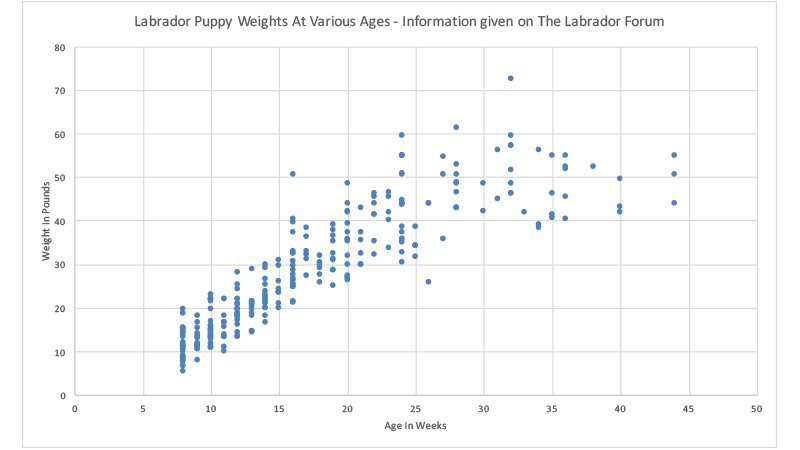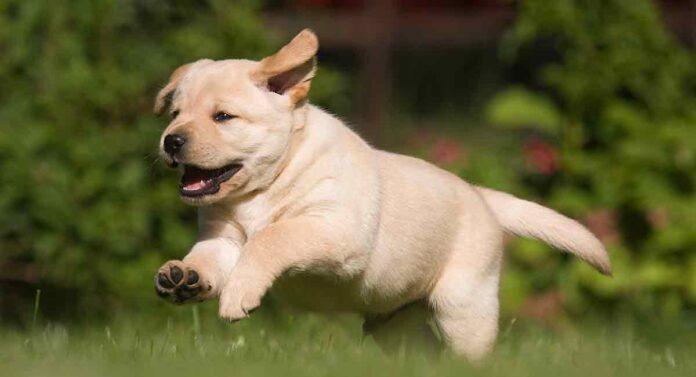A Labrador puppy growth chart can help you to check your puppy’s development is on track. Watching your baby Labrador Retriever puppy grow into an adult dog is worrying sometimes, but you can tell whether your puppy’s growth is on the right track with our Labrador puppy growth chart.
I will share the average Labrador weight, height and general Labrador size at different points of their life. I’ll answer all of your Labrador puppy growth questions.
- Labrador puppy growth chart.
- When do Labs stop growing?
- How much do Labs grow after 6 months?
- Can you tell how big a puppy will get?
Growth rates depend on a number of factors, including your dog’s breed or type, the size of their parents, their diet, age and health. We will help you to use these factors with out Labrador puppy growth chart to predict your dog’s final height and weight.
Labrador Puppy Growth Chart
We have a long running thread on our forum, where members enter the weights of their puppies at different ages. The Labrador growth chart below shows the data we have collected, in a Labrador weight chart by age.

Each dot represents a snapshot in time of an individual puppy. You can find the age in weeks along the bottom of the chart and weight in pounds up the left hand side. You can see how all the dots taken together follow a pattern, but there is still a considerable range of puppy weights at each age.
When Do Dogs Stop Growing?
If your Labrador is four years old, he is not going to get any taller, but what about a two year old Lab, or a one year old? Most dogs stop growing sometime between one and two years old, but it varies between breeds.
When Is A Labrador Fully Grown?
Many dogs are fully grown by their first birthday. Small breeds reach adult height several months before large breeds do, yet dog size varies greatly among individuals, even within the same breed.
Larger dogs are often slower to mature than little dogs, and carry on growing for longer. Small dogs are sometimes fully grown by the time they are 9 months old. Whereas giant breeds can take up to three years to reach full size.
Adult size, temperament, and coat type are all likely to affect energy requirements, and the rate a puppy grows. There is no point comparing your Lab puppy’s growth with your neighbor’s German Shepherd Dog puppy.
At What Age Does A Labrador Puppy Stop Growing?
There is very little scientific research – but a lot of anecdotal evidence – about when Lab puppies stop growing.
In 2004, a UK study following 37 Lab puppies through to adulthood revealed that all of them had reached their adult weight by their first birthday. But more recently, a much larger lifestyle study of over 4,300 UK Labradors found that their weight continued to increase between one and four years old.
When Do Labs Stop Growing?
The Labrador puppy growth chart finishes when the dog reaches adulthood. General wisdom from breeders, vets, and experiences Labrador owners is that Labs stop growing during their second year. But much of your Lab puppy’s growth will be completed before he reaches his first birthday. In fact, he will be quite close to his final adult Labrador height at around nine months of age. A lot of his growth after this point will be ‘filling out’ rather than getting taller.
Does color change the Labrador puppy growth chart?
Lab growth rate isn’t impacted by their color. Your average chocolate Lab will be adult sizes at the same time as the average yellow or black Lab.
How Quickly Do Labradors Grow?
Our Labrador puppy growth chart shows that all Labrador puppies follow the same breed specific pattern of growth spurts and slower growth, even though the actual numbers on the scale will vary from individual to individual. You’ll notice that your Labrador puppy at 8 weeks old or 9 weeks old when they arrive home will quickly change size. The most rapid period of growth will take place in the first month or so after you bring him home.
In 2007, a study of 150 Labrador puppies in Norway found that Labrador weight gain is most rapid at 89 days old in females, and 95 days old in males. So around the 12-14 week mark. And Labradors usually reach half of their adult weight by the time they are 18 or 19 weeks old.
How much do Labs grow after 6 months?
Another trend you can see in our Labrador puppy growth chart is that Lab puppies gain weight much less rapidly after their 6 month birthday. Once your Lab has hit this milestone you can expect them to gain a little height, and probably continue to fill out for up to a year or so. But on the whole, a Lab who’s petite at 6 months is likely to be petite all her life. And you needn’t worry that a boy who already weighs 50lbs at 6 months is going to end up the size of a Great Dane!
Another important milestone to look out for after 6 months is the completion of ‘upward growth’. In other words, the point when you Lab stops getting any taller. This is the point at which your dog’s bones stop growing, and most experts feel it is safe for them to begin long runs and activities involving jumping without damaging their joints.
Don’t assume that your dog will stop growing upwards when they reach the height on the Labrador breed standard though. It is estimated that in the UK the average height at the shoulders of a male Lab is around an inch taller than the breed standard.
Will my dog still grow after being neutered?
It’s possible that an early neutered dog will be a little behind on the Labrador puppy growth chart. But it’s not a certainty.
Whether or not dogs should be routinely spayed or neutered is a subject which divides opinion.
A 2017 study found that neutering before 37 weeks old is linked to very slightly more rapid growth, and neutering after 37 weeks leads to very slightly slower growth. But the difference was very small, and the researchers emphasized that it doesn’t require special planning.
Average Lab Weight
Adult Lab weight as shown on the Labrador puppy growth chart show that how big a Lab gets varies. But you want me to give you some numbers, so here are some averages.
- Many adult female Labradors reach a weight of 55-75lbs and stand 21-22 inches high at the shoulder.
- Many adult male Labradors reach a weight of 65-85lbs and stand 22-23 inches at the shoulder.
But remember, your dog is probably not an average dog!
Can you always predict size with a Labrador puppy growth chart?
These Labrador height and weight numbers are broad guidelines.
How big your Labrador will get depends partly on his parents. Assuming that your puppy had slim parents, their own weights will give you an idea of how big your Lab is likely to grow.
American Labrador puppy growth
Show bred English Labs are often heavier in build and bone than field bred American Labs, which tend to be more racy in appearance.
Small parents
Size is also partly genetic. If your puppy had small parents he might well be on the small size for his age, throughout his life. But even puppies from the same litter can vary quite considerably in size when plotted on a Labrador puppy growth chart.

How much should my Labrador puppy weigh?
Many ‘average’ Labrador puppies weigh just over two pounds for each week of age. So on the Labrador puppy growth chart at around three months such a puppy might weigh 25lbs, and at six months they’ll reach 50lbs.
It is rare for puppies to have any kind of growth disorder. Or for their families to starve them by mistake! If you can’t see your puppy’s ribs and he is bouncy and full of fun, the chances are he is just a small puppy.
Is my puppy is too fat or too thin?
The very best guide to whether a puppy is the right weight for him, is how he looks and feels. Not where he falls on an average Labrador puppy growth chart.
Physically examining and observing your puppy will help you decide if they are doing ok in this respect. Just like older Labradors, puppies should not be too heavy. Most experts nowadays like to see a waist on even quite young puppies.
Overfeeding puppies doesn’t just make them roly-poly plump. It causes their bones to grow too rapidly as well. And this may result in painful skeletal abnormalities in later life. Chubby Lab puppies might be plotted higher than average on the Labrador puppy growth chart, but if they are a shorter stature they could be following the line.
Run your hands gently down your puppy’s sides and you should be able to just feel his rib cage. If you can see his ribs, or feel them very easily just beneath his skin, your Labrador puppy is too thin. But if you can’t feel them at all, he might be a little overweight. If in doubt, check with your veterinarian.

My dog weighs 35lbs at six months old. Is that OK?
This is the most common variation we receive on ‘how much should my puppy weigh?’ People share their puppy’s weight and age, and want a Labrador puppy growth chart to tell them it is ok. I mentioned above that an average Labrador might weigh around 50lbs at six months old. But there is huge variation around this figure.
To illustrate how much very healthy puppies may vary, there are 6 month old Labs on our forum weighing 30lbs, and others weighing 60lbs! These are very different points on the same Labrador puppy growth chart, but could both be healthy animals.

What age does a puppy turn into a dog?
Maturity or being an adult is not just about growing bigger. There are three aspects to changing from puppy to dog:
- physical maturity
- sexual maturity
- and mental maturity.
Sexual maturity in puppies
Puppies become sexually mature before they are full grown. These sexually mature pups still belong on the Labrador puppy growth chart, and will gain weight and height. Most Labradors are physically capable of breeding while still puppies. Though of course they should not be allowed to do so. Many female Labradors come into season for the first time between at between six and nine months old. Though some will be over a year old. And most male Labradors are ready and willing to mate well before their first birthday!
Mental maturity in puppies
Not only is your Labrador physically still a puppy when he or she reaches sexual maturity. He is also very much a puppy mentally and emotionally. In fact, many experts do not consider a Labrador to be fully grown up and mature until they are around two years old.
In practice, there is no exact age at which you can definitely say your puppy is a grown up. Some puppies mature mentally and physically quicker than others. As a broad guide, you will often hear people use 18 months as the divide between Labrador puppy and adult dog.
The Labrador Site Founder
Pippa Mattinson is the best selling author of The Happy Puppy Handbook, the Labrador Handbook, Choosing The Perfect Puppy, and Total Recall.
She is also the founder of the Gundog Trust and the Dogsnet Online Training Program
Pippa's online training courses were launched in 2019 and you can find the latest course dates on the Dogsnet website




















I have a black lab English and American lab mix. He just turned 5 months and weights 58 lbs, will he keep growing at this rate?
My 8 month old male black lab is already 26 inches (to withers) – a couple of inches taller than the average adult male.
He was the last born, tiny runt, almost died, rejected by mother, bullied by siblings so removed and human-fed/reared instead.
At 12 weeks, vet said he was still underweight.
Now, at 8 months, he is HUGE; as in very strong and muscular, not an ounce of fat on him, very long legs, still growing into his massive paws, narrow head, long tail one ear flops down, the other is a bit wayward. He has very high energy levels, extremely friendly, bouncy and curious with a little stubborn streak.
His black mother is tall and leggy with the same odd ears and American/working type build – she was not registered with KC due I was told to ‘clerical error’. She is placid, laid-back was never hyper even as a puppy.
His father, a red fox(yellow), English/field type was KC registered with full papers available. He is strong and energetic.
At least half a dozen people have asked me recently if my giant puppy has any Great Dane in him.
Is it worth getting him DNA tested?
He gained 43 pounds in a month???? That’s insane
Sorry Correction: 13 weeks. That made more sense. Haha! Still a huge jump
We have @9-10mo old black male lab, rescued just before Christmas with just an estimate of age. We sent DNA through Embark and his results came back as 66.1% lab, 10.5% Golden Retriever, 9.4% German Shepherd, 5.1% Boxer and rest super mutt. 3 other litter parents and I have been in frequent chats about our great pups and ours is definitely the lightest, despite other many similarities in looks and behavior. He has always been lean and tall; currently 61.5 lbs and @24 inches tall at front legs. A piece of me has this nagging worry about his weight; but we think he looks great. He eats 4 cups of Blue Buffalo large breed puppy in total (2 feedings).
We have an 8 month old English Labrador. Her parents and sibling are all very large. She was NOT the runt of the litter. I don’t think there was a runt. Dad is 110 lbs Mom 95 lbs. We took her to a puppy class in the summer and there was a male lab a week younger that looked like he was two months older.
She was 43 lbs at 6 months. The vet told me that our dog would probably only be 50 lbs. I’ve kind of been in shock ever since. I spoke to the breeder she got upset since breeds her dogs to be large dogs. She said I must be doing something wrong with feeding her. We’ve increased her food but sometimes she’s just not interested now. She is our 3rd lab. I’m not as concerned with her weight as I am of her height. Labs love to eat so I’m kind of doubting 50 lbs. She’s smart and lovable but I get a pit in my stomach thinking I did something wrong.
hey feed her beef with egshells one chickenwing and oats with some milk all together in a bowl plus water and barf powder she will be fine :))
My English Lab weighed in at 109# when I rescued her at age 6yrs.
This year she weighs in at 123#, and her Vet checked her labs.
She came back with a diagnosis of “thyroid” disease, so we are playing with the proper dosage for her now.
Had her on a ‘high protein, no grain diet, but am modifying with weight management, vegetables, etc.
I am mobility impaired so her walks are not as good as they could be. We play indoors and she will run around the furniture for exercises. Any suggestions for foods I can incorporate in her diet which are no or low calorie.
BTW, she lost 7# in the first 6wks. on her new thyroid medicine. She is 7yrs. old now. Does she still need a high protein, no grain diet?
My English lab is 20 weeks old and weighs 54lbs.
And he is lean. Growth is based on genetics, health and how much food is offered.
I dropped a line when my blackie, Sally, was 10 weeks old; now she is 38 weeks. I had hoped for a small Lab, but Sally evidently has other plans, for she weighed in at 68# this morning. So much for that! But I love every pound of my beautiful, willful teenager and wouldn’t trade her for anything. 75#? 80? 90? Gaaa…